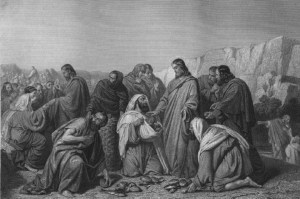Yesterday was Shrove Tuesday, so today is the first day of Lent, a forty day fast that takes us right up to Easter. It came about because Jesus fasted for 40 days as he walked the wilderness prior to his death on the crucifix. Foods like meat, eggs, cheese and milk were decadent and therefore they were right out during Lent. In fact there was abstinence from any activity considered decadent, and the further back in time, the stricter were the rules. In the early days of Christian Britain some people ate only bread, whilst others ate herbaceous vegetables too. As time went on to the Middle Ages, the rules became a little slacker and fish were allowed into the diet. Thomas Aquinas was a main instigator of this move.
“By Jove, look at all the tucker Jesus has got, chaps!”
The Miracle of the Loaves and Fishes
Fish was chosen for several reasons: It was fare that could be eaten by all classes, so in effect everyone would be eating the same types of food, nor was is associated with power, strength, hotness and richness like meat was; indeed fish were both humble and meagre. Most importantly, it was strongly associated with Jesus himself. The 40-day long fast also symbolised a cycle of ‘purification and regeneration’ and fish were considered pure. People always find loopholes however – the rich still ate large grand dishes like roast pike. Indeed anything even closely associated with water was considered fair game during Lent: beaver, seal, porpoise, heron, even sheep found drinking from streams were eaten!
Fair game: the beever
By Tudor times, the rules had slackened even further to include fish and game, but not red or white meat (i.e. poultry). This meant one could eat bustard, curlew, pheasant, quail and red deer. Strangley, root vegetables were off the menu because they came from the soil and were a little too close to Hell for comfort for some.
In France during the eighteenth and nineteenth centuries there were sometimes no difference between Lenten meals and regular ones, at least for the aristocracy. People would simply find excuses not to fast, complaining, according to the great French gastronome Brillat-Savarin “it irritated them, gave them headache, and prevented them from sleeping. All the troubles associated with the spring were put down to the score of the fast, so that one did not fast because he thought he was poorly, another because he had been, and a third because he feared to be.”
The late, great Brillat-Savarin
Most of the time it was enforced, though not for reasons of piety, but for economical ones. For example on a typical day, the French Royal Family in the Palace of Versailles, France, went through 900 pullets, 350 braces of pigeons and 86 goslings!
The Palace at Versailles
These days, people give up one vice for Lent, and although I am an atheist, I do see the spiritual worth in giving up something. Back in the day, when I used to smoke, I would try and forego cigarettes but without much success. These days I don’t bother, so I suppose I’m going straight to Hell; at least there’ll be plenty of parsnips and carrots down there to roast by the fire and brimstone…
If you like the blogs and podcast I produce, please consider treating me to a virtual coffee or pint, or even a £3 monthly subscription: follow this link for more information.




